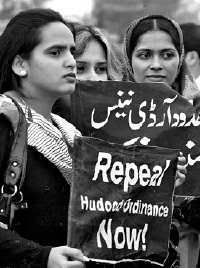 Women Protection Bill, 2006 (“WPB”) has finally passed, in an overwhelming majority vote, by the Pakistani Senate. MMA in a last attempt to make WPB ineffective suggested 17 amendments, which were all rejected by the Senators. Having already been cleared by the National Assembly, the only thing left, procedurally, for the bill to become law of the land is Presidential consent.
Women Protection Bill, 2006 (“WPB”) has finally passed, in an overwhelming majority vote, by the Pakistani Senate. MMA in a last attempt to make WPB ineffective suggested 17 amendments, which were all rejected by the Senators. Having already been cleared by the National Assembly, the only thing left, procedurally, for the bill to become law of the land is Presidential consent.
WPB is the first step towards changing the draconian rape and adultery laws, which were implemented by the President Zia-ul-Haq. The present Musharraf government has fought very hard to get these changes through and to make these amendments possible. This is not to suggest that these amendments are in anyway adequate or enough, however, they are the first step. WPB has been severely compromised by the pressure from MMA. They were some changes suggested by them, which have been incorporated in the Bil (text of changes available courtesy of eteraz.org). However, the entire text of the Bill still remains unavailable; therefore, it is very difficult to comment on the same with any certainty.
Ali Eteraz does offer some analysis on WPB and the issues with the same:
“Rape is now tried under the secular penal code, and the Sharia courts do not have jurisdiction over rape/rape-allegations.
This means that rape does not have to be proven by four witnesses (it can now be proven by circumstantial, even DNA evidence). The part on rape is the biggest victory of this bill. Rape has been totally separated from adultery or any other crimes of chastity.
Non-rape extra-and-pre-marital sex acts are still tried by the Sharia courts.
However, “lewdness” (a new offense which includes both adultery and pre-marital sex) will be tried by the secular courts.Yes, that means that two different court systems will have power over adultery and pre-marital sex: adultery/fornication matrix for Shariah courts; lewdness matrix for secular courts.
Those two courts systems will fight over it, and I have no idea how they determine who gets to try them. That is actually the million dollar question. My lawyer friend suggests that it is a judge which determines the jurisdiction. Question is: is that a Sharia judge or a secular judge?�
 The analysis further suggests that the matter would fall within the jurisdiction of Shariah court because of the Article 203D and 203DD (which describes the power of Shariah Court). This may not be necessarily true, and these questions of procedural and interpretation of law would only become clear with the passage of time and development of case law under the amended law.
The analysis further suggests that the matter would fall within the jurisdiction of Shariah court because of the Article 203D and 203DD (which describes the power of Shariah Court). This may not be necessarily true, and these questions of procedural and interpretation of law would only become clear with the passage of time and development of case law under the amended law.
However, it needs to be noted that most of the analysis is based on hearsay and is based on assertions and presumptions from other sources. Nonetheless, the analysis offered does deal with some of the legal and constitutional issues that may/will arise in respect of WPB. The limited text, which is available on Eteraz and the commentary in the newspapers all suggests that even at its best WPB, is extremely vague and there are various ambiguities and loopholes in the same. Any detailed and concrete analysis of legal issues would have to wait until the availability of the draft legislation.
 Nevertheless, it would not be wrong to say that the Presidential consent would not be the end of WPB both politically and legally. Politically there is the dilemma of threat by MMA of resigning from the National Assembly. Legally there are issues of constitutional law as well as procedural law attached with this legislation. In context of legal issues, this matter will only be conclusively decided either by the decision of the Supreme Court of Pakistan or by further amendments to the legislation.
Nevertheless, it would not be wrong to say that the Presidential consent would not be the end of WPB both politically and legally. Politically there is the dilemma of threat by MMA of resigning from the National Assembly. Legally there are issues of constitutional law as well as procedural law attached with this legislation. In context of legal issues, this matter will only be conclusively decided either by the decision of the Supreme Court of Pakistan or by further amendments to the legislation.
Umera Ali is a lawyer and blogs at Pointless Conundrum.



















































To Site Admin,
Comment edit is not functioning properly. I have just edited my last comment but its not showing up.
Adnan,
[quote post=”437″]Family of my women/girls have equal rights as me or any other guy.[/quote]
Good for them, so why not pass the laws which will give all human beings their basic rights as not all families are so justice loving.
[quote post=”437″]is it not like I claim I know saudi culture because I was over theore twice for umrah purpose?[/quote]
OK, but it never stopped you criticizing the west. You are missing one crucial point. I grew up in Pakistan.
Mq,
Life is hard in Pakistan as we are not known for giving people their personal spaces.
Some objections of Mullahs on WB answered in this column of Nazir Naji;(http://www.jang-group.com/jang/dec2006-daily /16-12-2006/col1.htm)
This discussion no longer seems to be on teh topic of the post and has become a personal squabble.
Anyhow, I am also interested in what teh next steps of the govt might be. With the MMA now
in internal turmoil, politically now may be best time to move quickly and just do away with Zia’s law and start fresh.
With the Hasba Bill decision from Supreme Court I think there may be compromise bw govt and MMA on this and that.